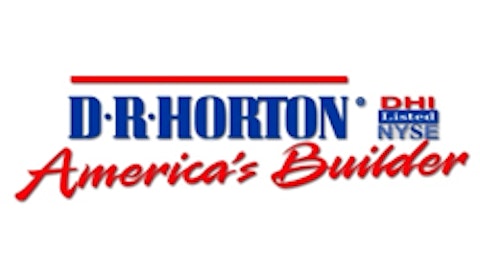Lennar Corporation (NYSE:LEN) released second-quarter financial results this week. The results easily beat estimates once again highlighting the ongoing recovery in the housing market, which has benefited homebuilders like Lennar, PulteGroup, Inc. (NYSE:PHM), and D.R. Horton, Inc. (NYSE:DHI) since last year. However, in recent weeks, rising mortgage rates have raised concerns that the recovery in the housing market could be shortlived.

Solid results and outlook highlight housing market recovery
Lennar Corporation (NYSE:LEN) reported earnings of $137.4 million, or $0.61 per share. Last year, the company booked $452.7 million, or $2.06 per share, for the same period. This huge difference is mainly due to a much larger tax gain last year. Excluding the tax gain, Lennar Corporation (NYSE:LEN)’s earnings for the quarter were $0.43 per share, compared to $0.21 per share reported in the year ago period. The company’s adjusted earnings were well above the consensus forecast of $0.33 per share.
Lennar’s revenue for the quarter jumped 53% to $1.43 billion, again beating Street estimates of $1.33 billion. Gross margin also improved significantly.
The homebuilder reported a 39% increase in deliveries to 4,464 homes. Orders rose 27% to 5,705 homes. Backlog at the end of the quarter stood at 6,163 homes, up 55%.
These results certainly highlight the ongoing housing market recovery and are in line with those of other homebuilders. In its most recently reported quarterly results, PulteGroup, Inc. (NYSE:PHM) reported net income of $82 million, or $0.21 per share, compared to a net loss of $12 million, or $0.03 per share, in the same quarter last year. The company’s backlog value increased 52%, while its unit backlog rose 35%. D.R. Horton, Inc. (NYSE:DHI) also posted a 173% increase in net income. Quarterly net sales orders rose 34%, while its sales order backlog rose 54% in unit terms and 76% in dollar terms.
Housing market data further confirms recovery
Apart from these impressive results, data from the housing market released earlier this week also confirms the recovery in the housing market. According to a report released by the Commerce Department, new home sales rose 2.1% in May to a seasonally adjusted annual rate of 476,000. The data beat consensus forecasts of a 468,000 annual rate. Meanwhile, a separate report showed that home prices in the U.S. posted their biggest year-over-year gain since March 2006 in April. The S&P/Case-Shiller index of home prices in 20 U.S. cities rose 12.1% in April. The gain was well above the consensus forecast of 10.6%.
However, despite all these positive signs, there is growing concern, sparked by rising mortgage rates in recent weeks, that the housing-market recovery could be derailed.
Rising mortgage rates
Freddie Mac’s weekly survey showed that 30- and 15-year fixed-rate mortgages averaged 3.93% and 3.10% respectively last week. Both rates fell slightly last week after rising for six consecutive weeks.
However, this survey did not take into account the aftereffects of Ben Bernanke’s comments following the release of the Fed’s latest monetary policy statement last week. Bernanke said that the central bank will start easing its bond buying program towards the end of this year if the economy continues to improve.These comments have likely pushed mortgage rates higher. The data for the most recent week will be released on Thursday and is likely to show a spike.
Mortgage rates in the U.S fell to record low levels last year thanks to the Federal Reserve’s QE3 program. However, they have risen sharply since the last month, as the market very correctly forecast what Bernanke just said about easing the bond-buying program.
Will rising mortgage rates derail the recovery?
Probably not, but it will certainly slow down the pace of the housing market recovery. All the positive news I just discussed come from a period when the rates were lower than they are now. With rising mortgage rates, we will probably see the negatives in the housing market data from June and July. One we have already seen – the Mortgage Bankers Association reported that mortgage applications fell 3% in the week ended June 21.
The sharp rise in mortgage rates has created some panic. However, as I said, higher rates are not likely to derail the housing market recovery; they’re just one of the factors that have contributed to housing’s rebound, alongside tight supply. Also, despite the recent spike, mortgage rates are still low by historical standards. Even if mortgage rates were to rise by a percentage point, they would remain below levels seen in 2004 and 2005, considered the peak period in the housing market.
So should you buy homebuilders?
Higher rates may slow housing’s recovery, but they certainly won’t stall it. Therefore, I am still bullish on homebuilders in the long term.
Homebuilders saw a huge rally in 2012 as the housing market recovery began. In 2012, Lennar Corporation (NYSE:LEN) gained more than 134%, PulteGroup, Inc. (NYSE:PHM) more than 69%, and D.R. Horton, Inc. (NYSE:DHI) more than 68%. Those significant increases led to concerns that homebuilders might be overvalued. However, homebuilders are still trading significantly below the levels they touched during housing’s 2005 peak.
Moreover, concerns over rising mortgage rates and their impact on the housing market recovery have led to a sharp decline in homebuilders in the last one month, with Lennar Corporation (NYSE:LEN) and PulteGroup, Inc. (NYSE:PHM) both falling more than 16%, and D.R. Horton, Inc. (NYSE:DHI) down 20%. The recent pullback, therefore, has presented an excellent buying opportunity for long-term investors, given that the housing market is likely to continue rising — albeit at a slower pace.
Varun Chandan Arora has no position in any stocks mentioned. The Motley Fool has no position in any of the stocks mentioned.
The article Should You Buy Homebuilders? originally appeared on Fool.com.
Copyright © 1995 – 2013 The Motley Fool, LLC. All rights reserved. The Motley Fool has a disclosure policy.




